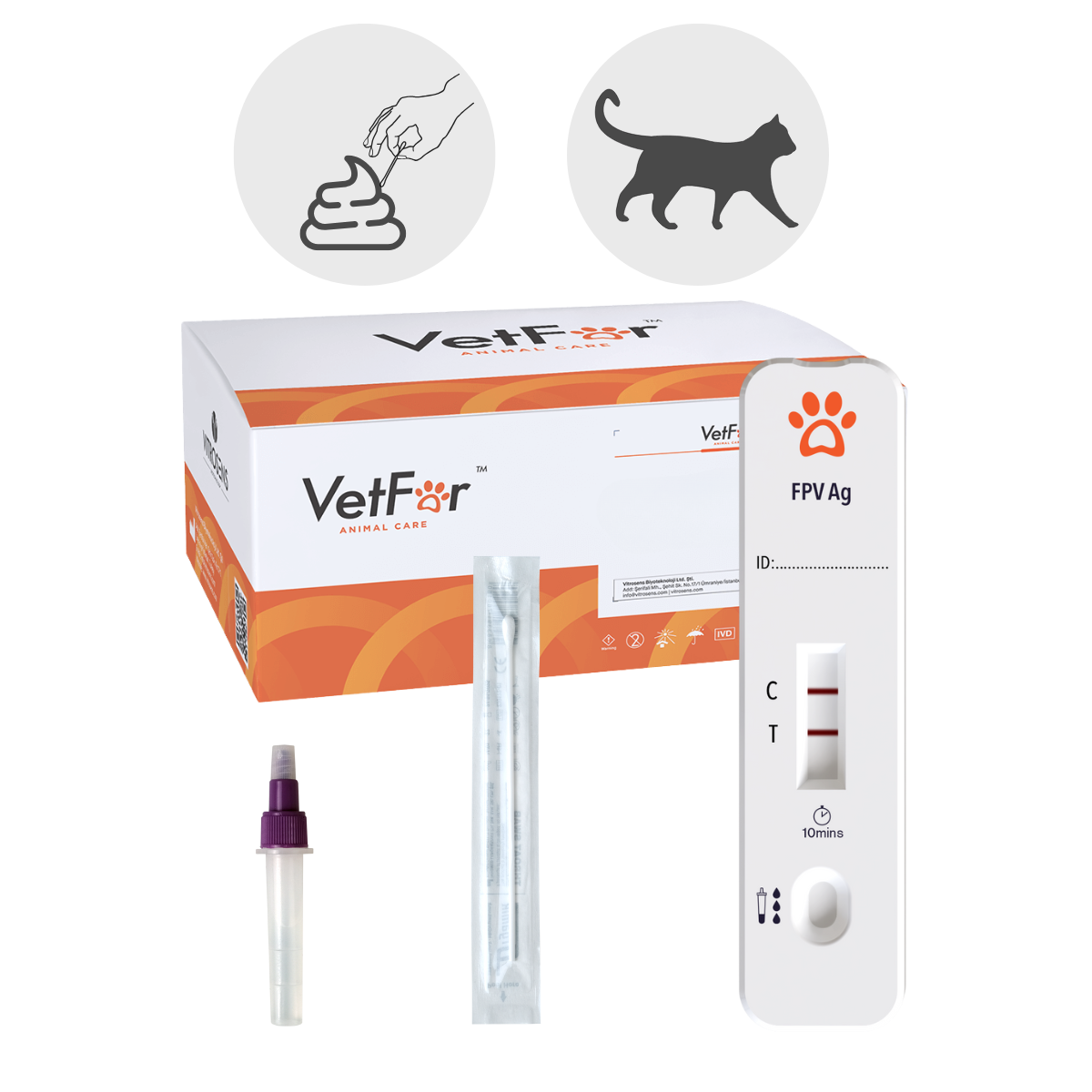Feline Panleukopenia (FPV) Antigen Test
This rapid test is intended for the detection of specific feline panleukopenia virus (FPV) antigens in cat fecal samples.
56,50 €
| Quantity | Price | Discount |
|---|---|---|
| 3-5 | 54,81 € | 3% |
| 6-9 | 53,11 € | 6% |
| 10+ | 50,85 € | 10% |
| Sample type |
Faeces |
|---|---|
| Target specie |
Feline (Cat) |
| Target |
Feline panleukopenia virus (FPV) |
| Packaging unit |
10 Tests |
| Sensitivity |
98,73% |
| Specificity |
98,44% |
The VetFor™ FPV Antigen Rapid Test is a veterinary in vitro diagnostic test for the rapid and reliable detection of Feline Panleukopenia Virus (FPV) antigens in cat feces.
The test is based on the lateral flow sandwich assay principle and provides accurate results within a few minutes. The ready-to-use kit contains all the necessary components for performance and is intended for use by veterinary professionals.
Product details
Test type: Lateral sandwich immunoassay
Target parameter: Feline panleukopenia virus (FPV) antigen
Sample material: Fecal samples from cats
Result time: Rapid test with direct evaluation after 10 minutes
Performance data
-
Sensitivity: 98,73%
-
Specificity: 98,44%
-
Accuracy: 98,55%
Cross-reactivity: No cross-reactivity with the following pathogens has been detected in cats: Feline immunodeficiency virus (FIV), Feline coronavirus (FCoV), Feline leukemia virus (FeLV)
Storage conditions: 2 – 30 °C
Content:
- 10 test cassettes
- 10 disposable bottles with dilution solution
- 10 sterile disposable sample swabs
- 1 instruction manual
For professional use only!
SHELF LIFE AND STORAGE
- The test kit must be stored at a temperature between 2 °C and 30 °C and a relative humidity of 40% to 60%. All components must be brought to room temperature before testing.
- Do not open sealed pouches and test kits until immediately before use.
- The test is stable until the expiration date. Do not use the test kit after the expiration date. The expiration date is indicated on the label/packaging of the sealed foil pouch.
- Do not expose the test kit to direct sunlight.
NOTES
- For in vitro diagnostic use only.
- For optimal test results, the manufacturer's instructions should be followed precisely.
- The tests should be conducted in compliance with biosafety measures and with protective clothing.
- The test kits must be kept in their sealed packaging until use.
- Do not use the test kit if the pouch is damaged or the seal is broken.
- The components of the test kit must not be reused.
- All components must be brought to room temperature before testing.
- The test kit may only be used up to the indicated expiration date.
- The components of this test kit have been tested as a standard batch.
- Do not exchange or mix components from different test kits.
- Do not touch the uncovered areas of the membrane in the test cassette.
- Inadequate or incorrect sample collection as well as improper storage and transport conditions may falsify the test results.
- All components of the test kit should be disposed of as infectious material.
You must be logged in to post a review.
Feline panleukopenia, also known as feline distemper, is a highly contagious viral disease that primarily affects young kittens. It is caused by the feline parvovirus (FPV), a non-enveloped DNA virus from the Parvoviridae family.
Transmission and environmental resistance
The virus is mainly transmitted through direct contact with infected animals and contaminated objects. Parvoviruses are characterized by extremely high tenacity and remain infectious for a long time across a wide pH range and at high temperatures in the environment.
Symptoms and disease progression
The incubation period is usually between 3 and 12 days. Affected animals show symptoms such as fever, loss of appetite, lethargy, vomiting, and diarrhea. Due to leukopenia, bacterial secondary infections can occur, worsening the prognosis.
Diagnosis
Diagnosis is made through clinical examination and laboratory analysis of blood and feces, with direct detection of the pathogen. A characteristic feature is the reduction in white blood cells (leukopenia).
Treatment
There is no specific antiviral therapy. Treatment is symptomatic and includes fluid therapy, antibiotics to prevent secondary infections, and antiemetic medications. In severe cases, intensive medical care is required.
Prevention
Vaccination is the most effective preventive measure. Cats should receive their first vaccination at 6 to 8 weeks of age, with boosters according to the vaccine manufacturer's recommendations. Due to the virus's high environmental resistance, thorough hygiene and disinfection of areas exposed to infected animals are also essential.
References
- Tiermedizinportal.de. (n.d.). Feline Panleukopenia. Available at: https://www.tiermedizinportal.de/tierkrankheiten/katzenkrankheiten/katzenseuche-feline-panleukopenie
- Thieme.de. (n.d.). Feline Panleukopenia. Available at: https://www.thieme.de/de/feline-panleukopenie-162054.htm
- Flexikon.doccheck.com. (n.d.). Feline Panleukopenia. Available at: https://flexikon.doccheck.com/de/Panleukopenie_der_Katzen
translated from German version





Reviews
Clear filtersThere are no reviews yet.